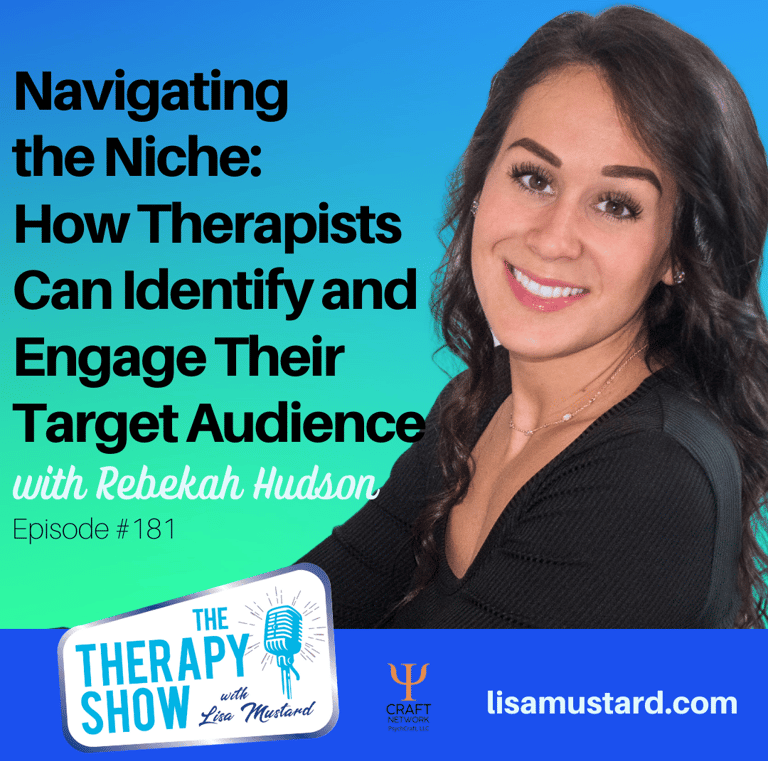Top 7 target audience Q&As mental health practitioners need to know
Don't be "eclectic" - Mental health marketing for therapists and coaches. Everything mental health practitioners need to know about Target Audiences including 7 of the most common Target Audience questions I get asked as a professional marketer for the mental health industry.
PROFESSIONAL WRITINGMARKETING
© Rebekah Hudson - Author
9/18/20236 min read
We have a saying in professional marketing. It’s one that got drilled into us on our first day in university and again during our first day of on-the-job training:
Those who try to market to everyone will market to no one.
Identifying and learning everything there is to know about your Target Audience is always step one.
Knowing the exact group of individuals you are trying to attract through your marketing efforts is marketing 101. The success of a private practitioner’s marketing strategy is largely determined on whether or not they have clearly identified and defined their target audience, yet so many therapists and private practitioners don’t have a clear vision of who their ideal client is.
As a professional marketer and copywriter for the mental health and wellness industry, I get asked a lot of questions on this topic, so let’s talk about it! Here is everything a therapist or coach needs to know about target audiences.
What is a target audience?
A Target Audience (TA) is a specific group of people who are most likely to want a particular product or service. Target Audiences are defined by three primary characteristics:
Demographics – Demographic information includes statistical or quantitative information such as age, gender, ethnicity, location, income, etc.
Psychographics – Psychographic attributes include qualitative information such as attitudes, interests, opinions, values, aspirations, psychological criteria, etc.
Behavior – Target Audience Behavior is a segmentation that focuses on the unique trends of behavior within a particular people group. Behavioral targeting examples include purchasing behavior, occasion-based behavior, etc.
Target audience examples in therapy
Mental health Target Audience Examples
Students (High school students, college students, gender-specific students, etc.)
Children ages 7-12
Adolescents ages 13-18
Teens and tweens
People going through a mid-life crisis
Couples (Couples considering divorce, couples needing divorce mediation, blended families, adoptive families, etc.)
Neurodivergent individuals (Age-specific neurodivergent individuals, neurodivergent couples, etc.)
People coping with severe anxiety
People struggling with behavioral or substance addictions (People with OCD, people with disordered eating issues, people struggling with substance abuse, etc.)
Parents (Mothers, fathers, new and first-time mothers, mothers with anxiety, first time parents, foster / adoptive parents, etc.)
Professionals (Executive and/or high-performing professionals, young professionals, etc.)
Military (Active duty, former active duty, military families, military spouses, etc.)
Learn more: 7 Growing target audiences and mental health niches to watch
This list is by no means exhaustive. For every single example listed above we could get even more specific and niche down further. There is an unlimited number of target audiences, and new target audiences are being formed daily.
7 Common Target Audience Questions
1. Why is having a target audience important?
If your goal as a therapist is to build your caseload and scale your private practice, you absolutely need to develop a strong marketing strategy, and step one is discovering your Target Audience (TA). For this reason, marketing yourself and your therapy/coaching services as "eclectic" can do more harm than good. (There is one exception to this rule. Keep reading…)
Think of your target audience like an actual target. Marketing represents the bow and arrow, and your ideal client is the bullseye.
Your goal with your marketing strategy is to hit that bullseye, but if you don’t have a clearly defined target, your marketing arrow will always be a shot in the dark. Maybe you’ll hit something, but probably not. And even if you do land a lead, there is no way to guarantee it will be your ideal client.
2. Marketing to a target audience is limiting – isn’t it?
I hear this concern a lot, and to be fair, it’s a very valid question. As with most rules, there are exceptions.
Exception to the TA rule: Depending on your location, you may not need a target audience.
Therapists operating in more rural areas honestly don’t need to niche down in my opinion. In fact, being more of a mental health generalist would be a savvier marketing approach simply because there may not be a lot of competition in your jurisdiction. Having a target audience is a competitive marketing strategy, but if you do not have a lot of competition, then a broader marketing strategy is more logical.
If your private practice operates in a more populated suburban or metropolitan area, however, then marketing to a specific TA is not limiting. It’s competitive. In a location that is saturated with options, getting crystal clear on the specific types of clients you want to attract is a proven strategy.
Regarding 100% online or virtual therapists, I would say that if there are already many mental health practitioners competing for the type of clients you want to work with, then taking a more specialized niche approach to your TA is recommended.
3. Do I really need a target audience?
It depends. If you are concerned that establishing a target audience for your private practice will limit your caseload, then there is really only one question to ask:
Are you currently completely satisfied with your caseload and the type of issues you are helping your clients address?
If your answer is, yes, then I do not think you really need a target audience. If you have managed to build the perfect caseload full of clients who are ideally suited to the type of therapy treatment you excel in providing, then I would say you are good to go. Sometimes, things just work out, and highly gifted counselors excel because word of mouth referrals travel quickly in some communities.
If not, then I would encourage you to consider clearly defining your target audience.
4. How is a Target Audience different from my Scope of Practice?
Your Scope of Practice includes the entire range of issues you are qualified, trained, and experienced to treat. This is what allows you flexibility and the legal/ethical ability to treat patients beyond your Target Audience.
For example, let’s use our bullseye target practice analogy again.
Your Scope of Practice is the whole target and represents the entire range of services you are licensed, experienced, and qualified to treat.
Your Ideal Client is the bullseye.
Your Target Audience is the bullseye plus the area on the target immediately surrounding your bullseye.
5. What is the difference between a niche and a target audience in therapy?
This is an excellent question. Let’s discuss…
Niches vs target audiences in therapy
A Target Audience is the WHO. It’s the specific group of individuals you serve. A niche is the WHAT. It’s the particular service(s) you specialize in and offer to your target audience.
For example:
Scope of Practice: You are a psychotherapist with training and experience in PTSD, cPTSD, anxiety, EMDR, Brainspotting, Internal Family Systems (IFS), psychodrama, Attachment theory, etc.
Your niche: You specialize in trauma-informed psychotherapy and EMDR.
Your Target Audience: Women, particularly women ages 25-55, who have experienced emotional, physical, or psychological trauma. They want to heal from past trauma, experience healthy and successful relationships, and cope with high levels of anxiety. They are prime candidates for EMDR because they are afraid of having to discuss painful memories in therapy and/or they may not even remember all the details. They want to know if EMDR is “right” for them, and they are looking for a trauma-informed mental health practitioner who can help.
6. Can I change my Target Audience for my private practice?
Of course, you can! 😊 Nothing is fixed unless you want it to be.
I know many examples of therapists who change and grow with their target audience. I know one therapist in particular started off as a therapist for adoptive parents. Then they got into play therapy for children which morphed into specialized counseling services for new mothers and parents. Now they provide parent coaching and family therapy.
In the same way your scope of practice naturally evolves throughout the course of your career in counseling, your target audience can evolve with you. As long as you follow some type of path that interconnects and builds on itself, you can rebrand and reinvent yourself anytime you want. Remember, your TA is just a strategy, and you can adjust that strategy any time you need.
7. How do I identify my target audience?
How to identify your target audience
If you are reading this and realizing that you need a target audience, then here are seven questions to help you discover your target audience.
WHAT is the primary problem your services help solve?
WHO has the primary problem your services help solve?
What types of services are you most qualified and experienced to treat?
Who is definitely NOT in your TA? Are there any types of clients who you would ideally prefer not to work with?
What type of client work energetically drains you?
What type of client work energizes you?
Are there any types of people for whom you naturally tend to have an abundance of compassion and patience?
The bottom line
Unless you are a therapist or coach operating in a rural area or are already enjoying a full caseload of ideal clients, you need a target audience. Having a target audience is part of a competitive marketing strategy and can help you attract your ideal clients and grow your private practice.
Once you know who you want to target, let’s talk! I help therapists and coaches earn their future client’s trust, establish web domain authority, and grow their brand’s value proposition with quality, SEO-friendly content. Contact me and request a free project quote today.
Learn more about content marketing for therapists: 3 Reasons why creating valuable content for your website is a MUST
This article was written to complement my conversation with Lisa Mustard, host of The Therapy Show podcast. For more on this topic, you can listen to the full podcast episode at the link below.
How Therapists Can Identify and Engage Their Target Audience


Terms of Service Privacy Policy
© Copyright 2026 Rebekah Hudson www.AlwaysRebekah.com
All Rights Reserved




